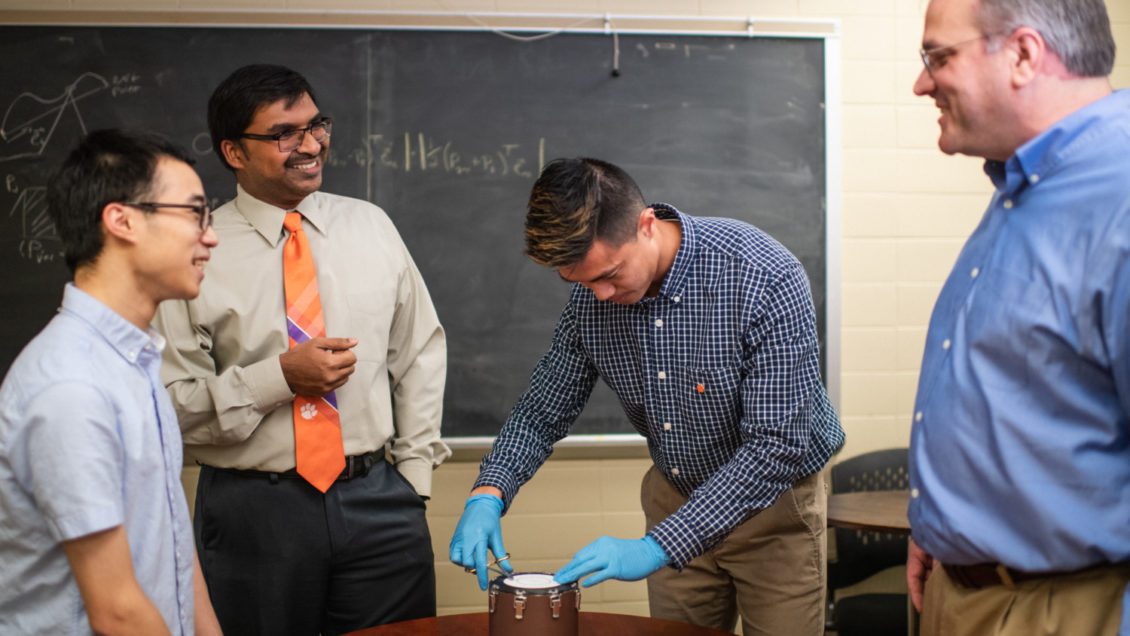CLEMSON — An important part of medical school could soon be upgraded for the digital age, as a group of Clemson University researchers develop the first simulator of its kind to help teach future vascular surgeons how to suture blood vessels.
The SutureCoach would come equipped with cameras and sensors to capture a range of data, including how the surgical tool and needle move and the forces the user exerts. Other simulators have been created, but the SutureCoach would be the first to combine these types of data to objectively measure vascular suturing skill.

It’s crucial that surgeons are proficient in suturing because blood vessels carry blood throughout the body.
Joseph Singapogu, an assistant professor of bioengineering at Clemson, is leading the development of the simulator. The work is funded with $1.1 million from the National Institutes of Health.
“Our ultimate goal is improved patient outcomes,” Singapogu said. “This research is based on the belief that the skill of a surgeon is one of the most critical factors that contribute to successful patient outcomes. We’re asking as a community, ‘How can we enable better, faster training?’”
Singapogu is collaborating with colleagues at Clemson, Prisma Health-Upstate, the University of Virginia and several vascular surgery educators across the country.

Over the next three years, the team will gather large data sets from residents, fellows and attending surgeons to get a better understanding of how a spectrum of skill can be reflected in metrics. Then it could be possible to set benchmarks that would be more formally incorporated into medical education.
“For now, we’re asking, ‘How can we best quantify vascular suturing skill?’” Singapogu said. “If we train people on these metrics, can we see if they get better faster?”
Martine LaBerge, chair of the department of bioengineering at Clemson, said Singapogu is well-positioned to help students improve their surgery skills.
“Dr. Singapogu has deep experience in simulation-based skills training to improve patient outcomes,” she said. “Further, the rich, interdisciplinary environment that Clemson has created with its partners, including Prisma Health-Upstate, serves as fertile ground for impactful innovation.”
The work on the simulator began in 2013 as a collaboration with John Eidt, who presented the need for the device and is a vascular surgeon at Baylor Scott & White Heart and Vascular Hospital in Dallas.
“The engineering team at Clemson is working to create a device that markedly improves our ability to teach surgeons how to optimize their surgical skills,” Eidt said.
The SutureCoach reunites Singapogu with David Cull, a vascular surgeon and the vice president of academic development for Prisma Health’s Health Sciences Center. Singapogu and Cull previously worked together to create a simulator to teach students to find arteriovenous fistulas, which are veins and arteries that have been surgically connected for dialysis.
Cull said he’s excited about the work on the SutureCoach.
“This research is aimed at helping future vascular surgeons develop a core set of skills to improve patient outcomes,” Cull said. “These new tools have the potential to accelerate training and provide performance-based metrics.”
Collaborators also include Richard Groff, an associate professor in Clemson’s Holcombe Department of Electrical and Computer Engineering, and Sara Riggs, an assistant professor of engineering systems and environment at the University of Virginia.
Anand Gramopadhye, dean of Clemson’s College of Engineering, Computing and Applied Sciences, said the research will help advance health innovation.
“The amount of the award is a testament to Dr. Singapogu’s hard work and the success he and his team have had in creating medical simulators,” Gramopadhye said. “They are well-positioned to help create a healthier society. I offer them my wholehearted congratulations on the grant.”
Get in touch and we will connect you with the author or another expert.
Or email us at news@clemson.edu

